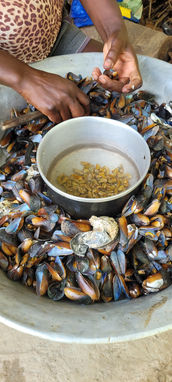Emergent Ecologies

Canoes on the banks of Iguape Bay

Iguape Bay Marine Extractive Reserve
The “Empowerment and Autonomy of Women Extractivists in the Iguape Bay Marine Extractive Reserve” Project, developed by the Behner Stiefel Center for Brazilian Studies in partnership with the communities of the Iguape Bay Marine Extractive Reserve in the Recôncavo Baiano region and supported by funding from Oceana, is a continuation of a project we began in 2023 with women shellfish gatherers and artisanal fisherwomen in southern Bahia.
In our first year of research (2023/2024), we learned that within environmentally protected areas known as Marine Extractive Reserves, (RESEX), women are highly engaged in the struggle for recognition, rights, and the maintenance of traditional ways of life. In the second year of research (2024/2025), we sought to deepen our understanding of these dynamics by looking at a different RESEX, the Baía do Iguape Marine Extractive Reserve. One of our objectives was to better understand the gendered social and political dynamics that come as a result of environmental protection, an aspect which has been less studied than more conventional conservation outcomes.



Methodologically, we started from observation, interaction, interviews, and reports from women shellfish gatherers and fisherwomen in the region, by listening to their histories, activities, and processes of political and social empowerment. At the same time, as an evolution of the research conducted in 2023, we understood that these communities want to be active protagonists in the writing of their own story. To facilitate this, we intentionally selected a group of community-based researchers—women shellfish gatherers or daughters of shellfish gatherers, recommended by local leaders. We taught them about anthropological fieldwork, interviewing, and how to present results in textual and audiovisual forms. The proposal to help empower the shellfish gatherers to present their communities' knowledge, is also part of a commitment to practicing an anthropology that is decolonial and liberating. Much of the research presented here, therefore, is the result of the work of these women. They represent their own communities, issues, conflicts, fishing techniques, and memories across different regions within the borders of the Baía do Iguape Marine Extractive Reserve. In the pages that follow, the community-based researchers demonstrate how affective engagements with place and with fishing practices, including feelings of belonging, pride, and love are effective methodological tools for capturing and representing local wisdom.

Canoes in the Port of Santiago do Iguape
Some of our following preliminary findings include:
-
The protection offered by the Extractive Reserve not only guarantees environmental sustainability but also access to traditional ways of life/autonomy and food security. It also enables political engagement, strengthening communities and valuing culture. We also highlight the importance of government benefits such as Bolsa Família and Bolsa Verde, which allow families to meet basic needs.
-
In this sense, artisanal fishing is also being strengthened, not just as a subsistence activity, but as a way of life traditionally passed down from generation to generation. It is a practice which nourishes ancestral and emotional ties. This bond is especially nurtured by women, who are responsible for onland shellfish fishing, a cornerstone of their families diet.
-
In our previous research, we found that women’s artisanal fishing is very much under threat, declining due to changes in the labor market, real estate speculation, and the loss of species and habitat. By contrast, female participation in the Iguape Bay Resex fishing economy is economically important. Oyster farming, in particular, is strong, in addition to other species including sururu, chumbinho, and other shellfish. The predominance of women in leadership positions and who are engaged in political processes related to securing and defending rights in the region, is notable.
-
Finally, we found that the harmful impacts of projects located outside of, but adjacent to, the RESEX pose serious threats to the well-being of the environment, people, and species residing within it. Large business and infrastructure initiatives such as ports and dams, directly impact the waters that flow into the protected areas. They change soil, and bring chemicals and solid waste, shaping the fauna, flora, and traditional communities that live there. Integrated environmental controls (at different levels of government), which track the cumulative impacts of various projects in a holistic manner are essential to ensure the preservation of environmental protected areas like the one featured here.
By clicking on the images below, you can access the various pages dedicated to the Iguape Bay Marine RESEX, the methodology used, and the four pages corresponding to each territory included in the research project.






















